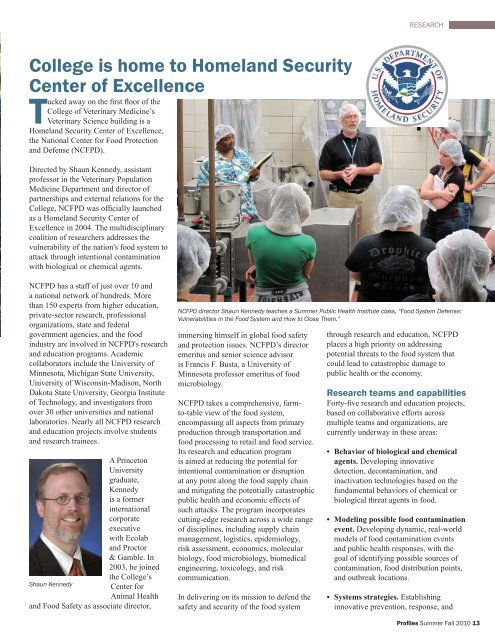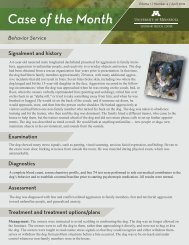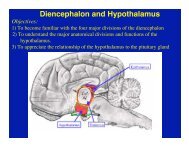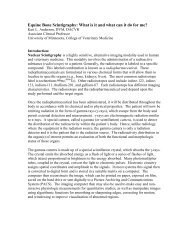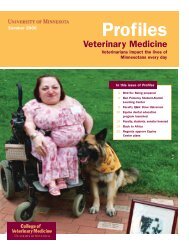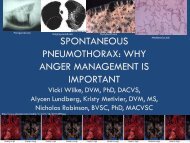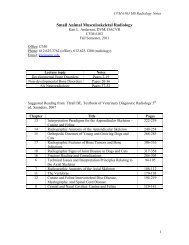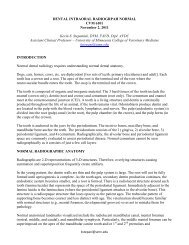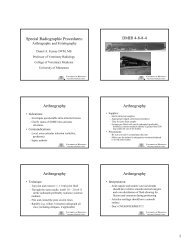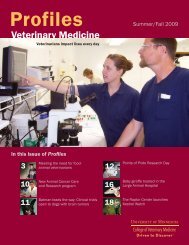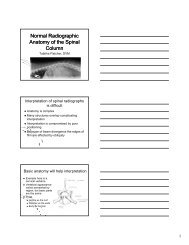Summer/Fall 2010 PDF Version - University of Minnesota College of ...
Summer/Fall 2010 PDF Version - University of Minnesota College of ...
Summer/Fall 2010 PDF Version - University of Minnesota College of ...
You also want an ePaper? Increase the reach of your titles
YUMPU automatically turns print PDFs into web optimized ePapers that Google loves.
RESEARCH<br />
<strong>College</strong> is home to Homeland Security<br />
Center <strong>of</strong> Excellence<br />
Tucked away on the first floor <strong>of</strong> the<br />
<strong>College</strong> <strong>of</strong> Veterinary Medicine’s<br />
Veterinary Science building is a<br />
Homeland Security Center <strong>of</strong> Excellence,<br />
the National Center for Food Protection<br />
and Defense (NCFPD).<br />
Directed by Shaun Kennedy, assistant<br />
pr<strong>of</strong>essor in the Veterinary Population<br />
Medicine Department and director <strong>of</strong><br />
partnerships and external relations for the<br />
<strong>College</strong>, NCFPD was <strong>of</strong>ficially launched<br />
as a Homeland Security Center <strong>of</strong><br />
Excellence in 2004. The multidisciplinary<br />
coalition <strong>of</strong> researchers addresses the<br />
vulnerability <strong>of</strong> the nation's food system to<br />
attack through intentional contamination<br />
with biological or chemical agents.<br />
NCFPD has a staff <strong>of</strong> just over 10 and<br />
a national network <strong>of</strong> hundreds. More<br />
than 150 experts from higher education,<br />
private-sector research, pr<strong>of</strong>essional<br />
organizations, state and federal<br />
government agencies, and the food<br />
industry are involved in NCFPD's research<br />
and education programs. Academic<br />
collaborators include the <strong>University</strong> <strong>of</strong><br />
<strong>Minnesota</strong>, Michigan State <strong>University</strong>,<br />
<strong>University</strong> <strong>of</strong> Wisconsin-Madison, North<br />
Dakota State <strong>University</strong>, Georgia Institute<br />
<strong>of</strong> Technology, and investigators from<br />
over 30 other universities and national<br />
laboratories. Nearly all NCFPD research<br />
and education projects involve students<br />
and research trainees.<br />
A Princeton<br />
<strong>University</strong><br />
graduate,<br />
Kennedy<br />
is a former<br />
international<br />
corporate<br />
executive<br />
with Ecolab<br />
and Proctor<br />
& Gamble. In<br />
2003, he joined<br />
the <strong>College</strong>’s<br />
Shaun Kennedy Center for<br />
Animal Health<br />
and Food Safety as associate director,<br />
NCFPD director Shaun Kennedy teaches a <strong>Summer</strong> Public Health Institute class, “Food System Defense:<br />
Vulnerabilities in the Food System and How to Close Them.”<br />
immersing himself in global food safety<br />
and protection issues. NCFPD’s director<br />
emeritus and senior science advisor<br />
is Francis F. Busta, a <strong>University</strong> <strong>of</strong><br />
<strong>Minnesota</strong> pr<strong>of</strong>essor emeritus <strong>of</strong> food<br />
microbiology.<br />
NCFPD takes a comprehensive, farmto-table<br />
view <strong>of</strong> the food system,<br />
encompassing all aspects from primary<br />
production through transportation and<br />
food processing to retail and food service.<br />
Its research and education program<br />
is aimed at reducing the potential for<br />
intentional contamination or disruption<br />
at any point along the food supply chain<br />
and mitigating the potentially catastrophic<br />
public health and economic effects <strong>of</strong><br />
such attacks. The program incorporates<br />
cutting-edge research across a wide range<br />
<strong>of</strong> disciplines, including supply chain<br />
management, logistics, epidemiology,<br />
risk assessment, economics, molecular<br />
biology, food microbiology, biomedical<br />
engineering, toxicology, and risk<br />
communication.<br />
In delivering on its mission to defend the<br />
safety and security <strong>of</strong> the food system<br />
through research and education, NCFPD<br />
places a high priority on addressing<br />
potential threats to the food system that<br />
could lead to catastrophic damage to<br />
public health or the economy.<br />
Research teams and capabilities<br />
Forty-five research and education projects,<br />
based on collaborative efforts across<br />
multiple teams and organizations, are<br />
currently underway in these areas:<br />
• Behavior <strong>of</strong> biological and chemical<br />
agents. Developing innovative<br />
detection, decontamination, and<br />
inactivation technologies based on the<br />
fundamental behaviors <strong>of</strong> chemical or<br />
biological threat agents in food.<br />
• Modeling possible food contamination<br />
event. Developing dynamic, real-world<br />
models <strong>of</strong> food contamination events<br />
and public health responses, with the<br />
goal <strong>of</strong> identifying possible sources <strong>of</strong><br />
contamination, food distribution points,<br />
and outbreak locations.<br />
• Systems strategies. Establishing<br />
innovative prevention, response, and<br />
Pr<strong>of</strong>iles <strong>Summer</strong> <strong>Fall</strong> <strong>2010</strong> 13


